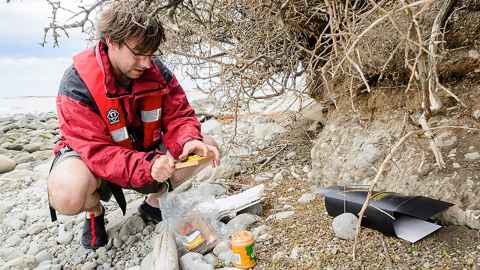University at heart of pest free ambitions
29 June 2017
When Auckland Council convened the first Auckland ‘Pestival’ to promote conservation and a new drive to rid the region of introduced pests, the role of University of Auckland research was to the fore.

The gathering, attended by a number of University experts, was held to celebrate community conservation work and explore future initiatives. It also saw the launch of Pest Free Auckland 2050, a programme to eradicate introduced pest plants, animals and pathogens by mid-century.
Its proponents say the programme has the potential to restore native ecosystems and make Auckland an international leader in conservation, demonstrating that a prosperous economy and a healthy natural environment can co-exist.
It comes hot on the heels of Predator Free 2050, an ambitious nationwide goal to rid New Zealand of the most damaging introduced predators – possums, rats and stoats – which threaten the country’s natural taonga, economy and primary sector.
Sir Rob Fenwick, Chair of the Predator Free NZ Trust and Kiwis for Kiwi Trust, told the Pestival that 25 million of our native birds are killed each year by predators. So a business as usual approach is unthinkable.
Technological and genetic advances will be key to tackling predators. These include special lures to attract them to traps, automatically re-setting traps, electronic monitors that transmit signals when traps are sprung and need to be re-set, and genetic mechanisms to impede predator reproduction.
The University of Auckland is closely involved in much of this work, with a number of academic staff contributing in professional and personal capacities.
In a joint venture with Landcare Research, the University hosts the Centre for Biodiversity and Biosecurity, which assembles cutting edge science teams with a view to establishing world-leading research, training and education programmes. These programmes support biosecurity and biodiversity work at local, national and regional levels, ensuring groups have access to world-class skills and innovation.
The University is also one of 17 partners in the Landcare Research-hosted National Science Challenge, New Zealand’s Biological Heritage, whose mission is “to reverse the decline of New Zealand’s biological heritage, through a national partnership to deliver a step change in research innovation, globally leading technologies and community and sector action”.
A team led by University of Auckland senior lecturer Dr James Russell has received Challenge funding to tackle invasive mammals on multiple fronts through a High-Tech Solutions to Invasive Mammal Pest Project.
As hosts of the project the University will oversee a number of critical projects which will inform the scientific breakthrough required by 2025 as an interim step in achieving a Predator Free New Zealand. The scale of this challenge should not be underestimated, but by drawing on cutting-edge research and collaborating with partners, we are optimistic of making the breakthroughs required.
This project seeks to deliver a major boost towards the Predator Free New Zealand 2050 goal, by enabling greater precision, scale and effectiveness in future pest control operations. It is exploring solutions including species-specific lures and toxins for stoats and possums.
“The University of Auckland has been at the forefront of invasive species research in New Zealand for many decades, so the University was a logical home for the high-tech solutions project,” says James.